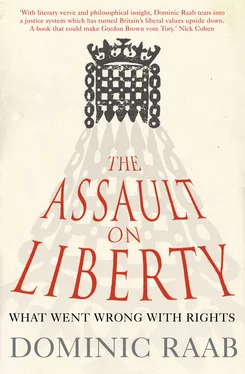1 ...7 8 9 11 12 13 ...16 Of the string of measures announced, none posed a greater danger to British liberty than the new proposals to extend detention without charge, a serious threat to the ancient right of habeas corpus. In 2003, the previous seven-day limit on detention without charge – which had proved adequate for dealing with Irish terrorism for the past twenty years – was doubled to fourteen days, in response to the terrorist attacks on 9/11. While all other serious criminal cases remained subject to a four-day limit (including drug trafficking, organized crime and complex fraud cases), in 2005 Tony Blair sought to extend the time limit in terrorism cases to ninety days, offering no credible evidence as to why yet another massive increase was necessary to protect the public. In November 2005 the ninety-day proposal was rejected, Blair’s first ever parliamentary defeat, but the limit on pre-charge detention was increased to twenty-eight days – as an extraordinary emergency power to be used only in the most exceptional of circumstances.
While the proposals were rushed through without an opportunity for thorough scrutiny, evidence made available since suggests that some increase in the powers of police detention beyond fourteen days was necessary to deal with the increased terrorist threat and the growing number, and increasing complexity, of cases under police investigation. Basic details of the number of suspects and volume of evidence in police counter-terrorism investigations demonstrate some of the operational pressures on police and prosecutors. This was backed up by public briefings from the Security Service, MI5. In 2006, the Director General of MI5 spoke publicly of thirty terror plots threatening Britain and 1600 individuals under surveillance. By 2007, her successor had revised that risk assessment – the Security Service was now monitoring at least two thousand individuals thought to be involved in terrorism – and estimated that there might be a further two thousand they were unable to track.
Nevertheless, the government also increasingly relied on the shroud of secrecy that covers the work of our counter-terrorism authorities to avoid explaining the reasons for extending the powers of the police to hold suspects without charge. And while it has demonstrated an insatiable political appetite for extending the maximum period still further – beyond twenty-eight days – it has not offered any convincing evidence to demonstrate that such a step is necessary.
Between 2005 and 2008 the government put forward numerous proposals to extend the detention without charge beyond twenty-eight days. Seemingly plucked out of the air, proposals for fifty-six, fifty-eight, ninety days and even indefinite detention without charge were all mooted – with the government settling on forty-two days in the face of widespread scepticism from Parliament and the wider public. Despite some indications that Gordon Brown might prove less cavalier as Prime Minister than his predecessor, he made clear his intention to press ahead soon after taking office in June 2007. The government forced the legislation through the House of Commons on 11 June 2008 by nine votes, despite a major revolt by Labour backbenchers and amidst widespread reports of reticent MPs being bullied or offered financial inducements to silence their dissent. One estimate put the price tag on securing the vote as high as £1.2 billion. In October, the forty-two days proposal was subsequently mauled from all sides in the House of Lords. The Home Secretary reacted by accusing all those opposed to forty-two days of ignoring the terrorist threat and withdrawing the proposal from the Counter-Terrorism Bill. Yet at the same time, she published a separate new proposal, with even wider powers to extend pre-charge detention to forty-two days, and threatened to force it through Parliament in the event of another terrorist attack – an irresponsible display of sublime political brinkmanship.
While the government cites police support for forty-two days, the equivalent of a short prison sentence, it has failed to articulate any persuasive justification or present any evidence to back up its case. Nor has it explained why other less repressive measures would provide inadequate alternatives. Instead of presenting a compelling case on the merits, the government has relied on popular nervousness after the 7/7 bombings and the – increasingly abused – public trust that the government would not seek additional security powers unless it was absolutely necessary.
So what is the strength of the case for extending detention without charge in Britain beyond twenty-eight days? A cursory comparison with international practice is revealing. At twenty-eight days the UK already has by far the longest period of pre-charge detention amongst comparable democracies. In Europe, France permits only six days’ pre-charge detention and Germany only two. While the continental justice systems operate differently, these represent the limits on the period of detention without formally laying charges before an accused. In common law countries with a justice system more closely comparable to our own, Australia allows twelve days’ pre-charge detention, New Zealand two and Canada just one day. In the US, after the horrors of 9/11 – and two terms of President George W. Bush’s war on terror – two days’ pre-charge detention has proved more than adequate in dealing with ten recent complex terrorism investigations. Outside the democratic world, Russian law only allows the police to hold suspects for five days, Zimbabwe only allows twenty-one days’ detention and even China only allows police detention of suspects for thirty-seven days. Britain, once a beacon of liberty, now has the longest period of detention without charge in the free world.
If international comparisons suggest that forty-two days is excessive, experience at home points to the same conclusion. While the security environment in Britain has changed in recent years, none of the counter-terrorism investigations in the UK to date have demonstrated the need for a longer period. Twenty-eight days was enough to comfortably deal with the most complex terrorism case we have ever faced, the plot to blow ten transatlantic airliners out of the sky at Heathrow in August 2006. If successful, it would have been the worst terrorist attack in British history, almost certainly causing a greater number of casualties than the attacks in the US on 9/11. Operation Overt, the police investigation that followed, was certainly complex – involving close cooperation with international partners, sifting large amounts of evidence (including computer hard drives and forensic analysis) and reviewing a wide range of suspects. It was held up, on both sides of the debate, as the litmus test case for scrutinizing whether the police can cope with a twenty-eight-day limit.
During Operation Overt, twenty-four suspects were arrested and seventeen were charged with terrorism offences. Of the twenty-four arrested all of those charged with the more serious offences of conspiracy to murder and conspiracy to blow up aeroplanes were charged within twenty-one days of arrest. Five were detained on lesser charges of ‘acts preparatory to terrorism’ (and other related offences) to the maximum limit of twenty-eight days.
The five held for twenty-eight days formed the crux of the government’s case for an extension of the time limit. Ministers claimed the police were coming perilously close to having to release terrorists, because they were running out of time to gather the necessary evidence to charge them. But do the facts back this up? Of the five held for twenty-eight days, three were released without any further conditions. They were not placed under any restrictions on release. They were not subject to a control order, or any other related measure, limiting their movements or activities – the clearest indication that, by that point, they were now believed to be entirely unconnected with any terrorist activity relating to Operation Overt. So, the three innocent suspects released after twenty-eight days do not provide evidence that the government needs a longer period of detention to prevent real terrorists from walking free.
Читать дальше












